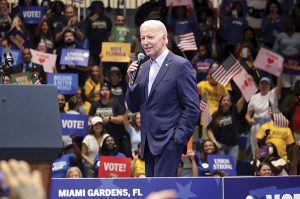Bloomberg
The US and China disagree on so many things, across so many spheres, that other world leaders are increasingly warning of a deeper rupture that could split the global economy.
With the stakes rarely higher, President Joe Biden heads to Bali, Indonesia, for his first in-person meeting with China’s Xi Jinping since taking office last year with promises to try to keep the relationship from getting worse and to reduce the risk of war over Taiwan. But the mood in both Washington and Beijing is only trending toward more confrontation, especially over the island that China claims as its own.
Biden will show up for the Monday meeting, which will take place on the sidelines of a Group of 20 summit, with a better hand than anticipated after Democrats posted better-than-expected results in the midterm elections, including retaining Senate control. That will give him more room to maneuver and make it harder for Republicans to scuttle his foreign-policy agenda. He told reporters in Cambodia that “I’m coming in stronger†to the meeting with Xi.
The Chinese leader doesn’t need to worry about pushback at home, particularly after he purged potential rivals at a Communist Party congress last month and set himself up to rule for years to come. But he’s also facing mounting pressure over the strict “Covid Zero†policy that has hurt China’s economy and sparked increasing public discontent.
The question is whether these two leaders, whose nations’ economies are so deeply intertwined, are headed toward a permanent separation or can find a way to at least calm relations in a face-to-face meeting. US officials have been cautious to keep expectations low, saying there will be no major announcements — or “deliverables,†in Washington parlance.
For the time being, the hope is that Biden and Xi can agree to restart military and climate cooperation that was halted after House Speaker Nancy Pelosi visited Taiwan over the summer, infuriating China. Progress beyond that will be a harder sell. Republican House Leader Kevin McCarthy, who may be in line to replace Pelosi, has said he wants to visit Taipei — a move that could again feed military tensions in the region.
Biden’s team accuses China of ignoring the status quo on Taiwan and ramping up tensions with a more aggressive posture toward the self-governed island. China similarly blames the US for stoking tensions, pointing to Pelosi’s visit and repeated remarks by Biden suggesting that American troops would defend Taiwan in the event of war — something no US president has explicitly committed to doing.
“They understand that there is the risk of action-reaction cycles leading to higher tension, then leading to more problems,†said Kurt Tong, a former US diplomat who served across Asia, including as consul general in Hong Kong and is now at the Asia Group consultancy.
Where once the US and China worked together to bolster global economic activity, lately they’ve been embroiled in a trade war, tit-for-tat sanctions and mutual condemnation. They offer fundamentally different views of the world and — a bigger concern for countries around the globe— seem to be asking governments to choose between them.
In private discussions, some officials from other countries say they want the US to make a concerted push to improve relations with China for the good of the region, especially given heightened fears of great-power conflict in Ukraine. Biden will discuss Ukraine and North Korea with Xi.
 The Gulf Time Newspaper One of the finest business newspapers in the UAE brought to you by our professional writers and editors.
The Gulf Time Newspaper One of the finest business newspapers in the UAE brought to you by our professional writers and editors.
